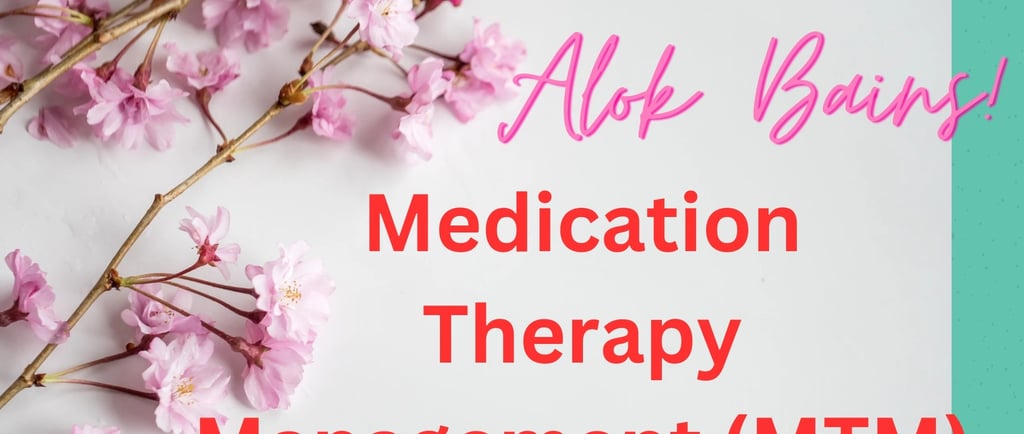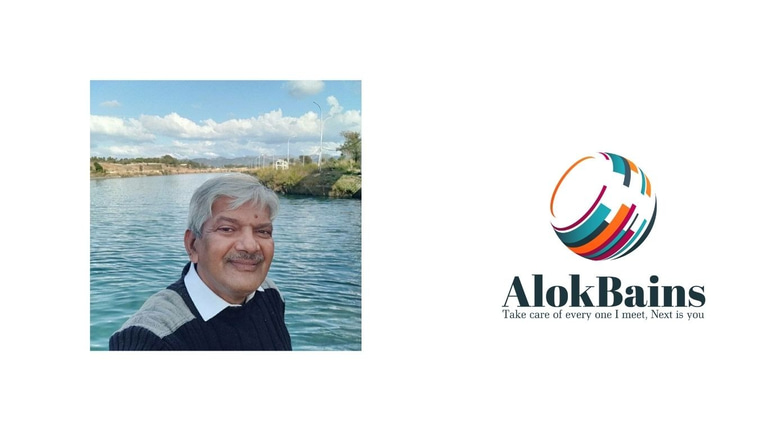Medication Management Therapy
Medication Management Therapy (MTM), Definition, Challenges, and Process
HOSPITAL PHARMACY
Alok Bains
5/28/20234 min read


Medication Therapy Management (MTM)
Compiled by: Alok Bains
Non-optimised use of medicines leads to overuse, underuse or misuse of the medication therapy. Medication optimization is a regular patient care process to achieve therapeutic goals. Medication therapy management (MTM) is a cost-effective strategy to optimize medication to achieve therapeutic goals. It is a medication-focused optimization strategy to standardize medication delivery and evaluate its benefits. It is patient-centred pharmacist services, not product-focused treatment. MTM is a set of services by the pharmacist to optimize therapeutic outcomes for individual patients.
Medication therapy management (MTM) is not prescription dispensing and disease management. It focuses on the entire medication regimen to optimize the therapeutic usefulness, effectiveness, safety, prevention of adverse events, address polypharmacy and medication adherence, and achieve optimal medication therapy outcomes. It also includes assessment and evaluation of adverse drug interaction, adverse drug events, concurrent diseases, patient lifestyle, lab reports, etc. It is a medication-focused optimization strategy to standardize medication delivery and evaluate the benefits of the entire medication regimen. It is patient-centred pharmacist services, not product-focused treatment.
In US and Canada, it is called Medication Management System while in the UK it is called Medication Use Review and n Australia it is called Home Medicines Review.
Difference between medication therapy management and pharmaceutical care
The pharmacist is a medication expert on the healthcare team. The term pharmaceutical care describes professional pharmacy practice as a discipline of clinical pharmacy. Pharmaceutical care is a broader term that encompasses the overall management of medication therapy in consultation with other healthcare professionals to achieve predefined therapeutic outcomes. Medication therapy management is an independent act of the pharmacist. It is a specific set of services within pharmaceutical care that encompasses medication review, problem identification and patient education to optimize therapeutic outcomes.
Definitions
APhA Definition: “Medication Therapy Management is a distinct service or group of services that optimize therapeutic outcomes for individual patients”.
“A program of drug therapy management furnished by a pharmacist, designed to optimize therapeutic outcomes through improved medication use, and to reduce the risk of adverse events and adverse drug interactions for the benefit of the patient.”
"Medication therapy management (MTM) is a distinct service or group of services provided by healthcare providers, including pharmacists, to ensure the best therapeutic outcomes for patients."
Goal:
MTM Services
MTM Services provides improved therapeutic outcomes with reduced healthcare costs. MTM service is a free service in most of the countries available to all. But pharmacists are legally entitled to be compensated for providing MTM service. It helps medicine adherence, especially chronic disease treatment, reduces medicines waste and optimizes health and medication outcomes. It is available for patients at least using at least one medicine.
MTM Challenges
MTM challenges are pharmacy workflow, healthcare team, new technology, Pharmacist reimbursement, and patient participation.
Pharmacy workflow: The availability of pharmacists and a formal system for an MTM is minimal in the hospitals. It has not been determined that MTM is a part of the dispensing system or a separate identity from the dispensing duty. It is difficult for a pharmacist to include MTM as a part of dispensing due to the heavy rush of patients in the hospital. Lack of time, paucity of trained pharmacists for MTM, excessive workload, absence of management’s support, and space limitations are some hurdles to implementing MTM.
Both pharmacists and patients feel a shortage of time for MTM. However, pharmacists can easily implement MTM with proper support from hospital management.
Healthcare team: Normally in hospitals, pharmacists are not a part of the healthcare team. This is a concern of frustration for the pharmacists. Most pharmacies are located separate from the healthcare centre. Thus MTM services are provided by the pharmacist without their integration into the healthcare team. Communication among pharmacists, nurses and general practices is difficult due to their hectic schedules. There is no standard procedure for a pharmacist to make a recommendation to a prescriber as a part of MTM. Other members of the healthcare system shall not easily accept any responsibility of pharmacists other than drug dispensing. Resistance from medical associations such as IMA is another barrier for pharmacists to provide MTM services. Medical practitioners shall have the opinion that pharmacists' role in MTM is a threat to their autonomy.
New technology: Technology is a challenge to deliver MTM services by pharmacists. Access to medical records is an essential part of a successful MTM. It is not easy for a pharmacist to access the health information technology framework. The adoption of computerized health record systems in the pharmacy is very minimal. Web-based vendors are available to support MTM services, billing and documentation. But it is not preferred due to security concerns, the absence of standardization of services provided by them and the lack of information sharing. The pharmacist shall also document all information in any other management system of the pharmacy other than this vendor site. This will be a difficult task for the pharmacist.
Normally pharmacist maintains automated software application to maintain and update medical claim, send and receive information between pharmacist and medical practitioner, etc. Each profile provides information for MTM.
Patient participation: Many patients have the opinion that pharmacists are medicine dispensers, not healthcare professionals. The patient hesitates to accept the pharmacist role to provide MTM service. MTM services by the pharmacist are not recommended by the medical practitioners and cost concerns are common barriers related to the patient. Many patients have the opinion that pharmacists are complicating their therapeutic plan and they are not interested in pharmacist MTM services.
Pharmacist reimbursement: Pharmacists are legally entitled to the consultation fees to be paid for the services provided by them But patients are reluctant to pay consultation fees to pharmacists, medical practitioners are reluctant to partner with pharmacists, absence of a standardized fee structure, poorly developed population health model, etc are barriers for pharmacist reimbursement.
Core Elements of MTM
MTM covers a broad range of pharmacist activities and responsibilities. Services provided by the MTM in pharmacy practice are divided into five core elements. Each is an essential part of the MTM. However, their sequence may be changed depending on patient needs. MTM assures the best benefits to patients.
Medication Therapy Review (MTR): To monitor and evaluate the patient’s response to therapy and the effectiveness of therapy. To identify, resolve and prevent medication-related problems including adverse drug events.
Personal Medication Record (PMR): To document the services delivered and communicated to the patient.
Medication-Related Action Plan (MAP): Assessment of the patient's health status to formulate a medication treatment plan. Selection modification and administration of medication therapy. To provide information and support services to improve patient adherence to therapy. To provide verbal education and training to improve patient understanding of medication.
Intervention and/or referral,
Documentation and follow-up.
